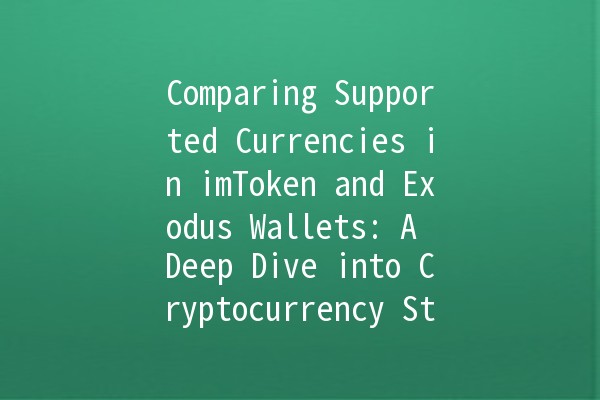Cryptocurrency wallets are fundamental tools for managing digital assets, yet choosing the right one can be challenging. In this article, we will explore the supported currencies of two popular wallets: imToken and Exodus. By understanding the strengths and weaknesses of each, you'll be better equipped to choose the wallet that suits your needs.
imToken is a mobile cryptocurrency wallet that allows users to manage various digital assets. It is particularly popular for its userfriendly interface and robust security features. imToken supports multiple blockchain networks, making it a flexible choice for users who hold a diverse range of cryptocurrencies.

Exodus is a multicurrency desktop and mobile wallet that initially gained popularity for its highly intuitive user interface. The wallet supports a wide variety of cryptocurrencies and integrates seamlessly with hardware wallets for added security. Exodus also offers trading features within its application, allowing users to swap assets conveniently.
imToken supports a wide array of cryptocurrencies, including:
Bitcoin (BTC)
Ethereum (ETH)
Litecoin (LTC)
EOS
TRON (TRX)
DAI
USDT
imToken focuses on the Ethereum ecosystem and frequently adds new tokens built on Ethereum through the ERC20 standard. This allows users to store a large number of altcoins alongside popular cryptocurrencies.
Exodus also offers a diverse portfolio of supported currencies, including:
Bitcoin (BTC)
Ethereum (ETH)
Litecoin (LTC)
Bitcoin Cash (BCH)
Dash
Ripple (XRP)
Tezos (XTZ)
Exodus emphasizes broad cryptocurrency support and allows users to easily trade between them through its builtin exchange feature.
While both wallets support major cryptocurrencies, imToken has a broader selection of lesserknown tokens, largely due to its integration with decentralized exchanges (DEX). This can attract users interested in upandcoming projects. Conversely, Exodus focuses on more established coins, which may appeal to new investors looking for stability.
imToken’s emphasis on Ethereum and all ERC20 tokens gives it an advantage for users invested in the Ethereum blockchain. In contrast, Exodus offers support for multiple blockchains, which includes assets like Bitcoin Cash and Ripple. This broader compatibility makes Exodus a more versatile choice for users with assets across various networks.
Both wallets prioritize user experience, but their approaches differ. imToken uses a streamlined mobile interface that's easy to navigate, especially for managing Ethereum tokens. Exodus, on the other hand, provides detailed charts and information, catering to users who want a more comprehensive overview of their portfolio.
Both wallets incorporate robust security measures, including:
Private Keys: Users have full control over their private keys in both wallets.
Backup Options: Each wallet offers backup recovery through seed phrases, ensuring that users can restore their wallets in case of device loss.
Biometric Security: imToken supports fingerprint authentication, enhancing security for mobile users.
Here are five techniques that can help maximize your productivity while managing your cryptocurrency wallet.
Keeping your wallet updated ensures app stability and security. Enable automatic updates to prevent missing out on crucial upgrades.
Example: Set a reminder to check for updates weekly.
Utilize folders or tags within your wallet to categorize tokens. Grouping similar assets helps streamline transactions and portfolio monitoring.
Example: Segregate your investments into categories like “Longterm Holding” and “Shortterm Trading.”
Setting up price alerts for specific assets can keep you informed without requiring constant monitoring.
Example: Use Exodus to set alerts for significant price movements in your portfolio.
Take advantage of each wallet's integrated trading features. This saves time and allows for quick transactions without leaving the app.
Example: Use imToken's DEX integration to swap tokens effortlessly without needing another platform.
Follow cryptocurrency news and market analytics to make informed decisions. Both wallets support resource integration to help users stay updated.
Example: Subscribe to a cryptocurrency newsletter for industry updates that influence your trading strategy.
imToken has robust security features, including private key control and seed phrase recovery. However, like all wallets, users must practice diligence, such as enabling biometric security and securely storing backup phrases.
Both imToken and Exodus allow for recovery using the seed phrase. Ensure you back it up securely and keep it offline.
Exodus offers builtin exchanges where you can swap cryptocurrencies at competitive rates without external platforms. Just select the assets you wish to trade, enter the amount, and confirm the transaction.
Both wallets do not charge fees for holding assets. However, transaction fees are incurred when sending cryptocurrencies, which vary depending on blockchain networks. Always check before making transactions.
Yes, Exodus supports integration with hardware wallets like Trezor, adding a layer of security for users who prioritize asset safety.
Both imToken and Exodus allow you to store multiple tokens, but imToken' support for ERC20 tokens means you can manage many more altcoins compared to Exodus's limited selection.
Both imToken and Exodus offer robust options for cryptocurrency storage, catering to different types of users. imToken excels in supporting a wide range of ERC20 tokens, making it ideal for Ethereum enthusiasts. On the other hand, Exodus provides an intuitive user experience and a broad crosschain capability, appealing to users with diversified investments. By considering your specific needs, you can make an informed choice that aligns with your cryptocurrency management goals.